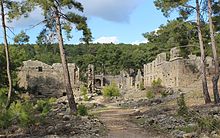Seleucia (Pamphylia)
Σελεύκεια | |
 Overview of Seleucia (2012) | |
 Shown within Turkey | |
| Location | Antalya Province, Turkey |
|---|---|
| Region | Pamphylia |
| Coordinates | 36°49′42″N 31°14′36″E / 36.82824°N 31.24343°ECoordinates: 36°49′42″N 31°14′36″E / 36.82824°N 31.24343°E |
| Type | Settlement |
| Site notes | |
| Condition | In ruins |
Seleucia (Greek: Σελεύκεια – also transliterated as Seleukeia) was an ancient Greek city on the Mediterranean coast of Pamphylia, in Anatolia, approximately 15 km northeast of Side; the site is currently about 1k north of the village of (also Bucakşıhler), approximately 12 km northeast of Manavgat, Antalya Province, Turkey. It is situated on a hilltop with steep escarpments on several sides making a strong defensive position. The track from the village has recently been clear felled but the main site is still within a mature pine forest. The German researcher Johannes Nollé has suggested, however, that the remains at this location are not those of Seleucia but rather those of Lyrba.[1] Another name for the city in the Middle Ages was Scandalor,[2] which was documented on portolan maps.[3]
A proof that this alternative name "Lyrbe" is accepted by the authorities can be found on a sign photographed in the same year the picture illustrating this subject was taken. A picture of the notice is followed by a gallery of what seems to be more properly called Lyrbe,

Lyrbe Notice on site

Lyrbe approaching Agora

Lyrbe back of north side of agora

Lyrbe Agora east side from low

Lyrbe east side of agora

Lyrbe northeast corner of agora

Lyrbe On agora edge

Lyrbe At northeast corner of agora

Lyrbe East agora buildings

Lyrbe Agora looking west

Lyrbe Eastern front

Lyrbe Agora part of front

Lyrbe Agora part of front

Lyrbe behind the agora front

Lyrbe Trench

Lyrbe Agora "basement"

Lyrbe Fragments

Lyrbe unknown buildings

Lyrbe

Lyrbe west of agora

Lyrbe Small temple

Lyrbe City entrance
There are remains of an agora containing a row of two-storey and three-storey building façades, a gate, a mausoleum, a Roman bath, a necropolis, in addition to several temples and churches. Because of its remote location, the site has not been plundered for building materials and the area is littered with columns and other items like large grindstones for flour making.
Modern scholars place the Pamphylian Selecuia near Şıhlar, north of the mouth of the , west of .[4][5]
References[]
- ^ J. Nollé, "Forschungen in Selge und Ostpamphylien", Araştırma 6 (1988), pp. 257–59.
- ^ Foglietta, Uberto (1600). The Mahumetane or Turkish historie containing three bookes: 1 Of the originall and beginning of the Turkes, and of the foure empires which are issued and proceded out of the superstitious sect of Mahumet. 2 Of their conquests and the succession of the house of Ottoman, vntill the present reigning of Mahumet the third. 3 Of the warres and seege of Malta, which Solyman the great made to the great maister and brothers of that order. Heerevnto haue I annexed a briefe discourse of the warres of Cypres, at what time Selimus the second, tooke from the Venetians the possession of that iland, and by reason thereof I haue adioyned a finall discourse conteining the causes of the greatnesse of the Turkish Empire. Translated from the French & Italian tongues, by R. Carr, of the middle Temple in London, Gentleman. Dedicated to the three worthy brothers Robert Carr, William Carr and Edward Carr, in the county of Lincolne, Esquires. https://books.google.de/books?id=ckxpAAAAcAAJ: Thomas Este. pp. 5–6.
- ^ Mason, Roger (1989). "The Medici-Lazara Map of Alanya". Anatolian Studies. 39: 85–105 – via JSTOR.
- ^ Richard Talbert, ed. (2000). Barrington Atlas of the Greek and Roman World. Princeton University Press. p. 65, and directory notes accompanying.
- ^ Lund University. Digital Atlas of the Roman Empire.
- Blue Guide, Turkey, The Aegean and Mediterranean Coasts (ISBN 0-393-30489-2), p. 496.
External links[]
- Archaeological sites in Antalya Province
- Ancient Greek archaeological sites in Turkey
- Seleucid colonies in Anatolia
- Populated places in ancient Pamphylia
- Ruins in Turkey
- Former populated places in Turkey
- Geography of Antalya Province
- History of Antalya Province
- Manavgat District
- Ancient Greek Asia Minor geography stubs






















